Take Advantage Of Big Discounts As the All-New 2019 Model Arrives
Crossovers and big SUVs are eating up the market, but not everyone is jumping on the bandwagon. If you want to buy a big sedan as a daily driver or family hauler, the Toyota Avalon should definitely be on your list. It offers nearly everything that this segment stands for: ample interior space, a high-quality cabin, an outstanding predicted reliability rating and no-nonsense performance.
Still, for as good as the 2018 version of the Avalon is, Toyota has fully redesigned it for the 2019 model year. You may want to see what the new version has to offer: Styling is radically changed (maybe too radical for you), it’s a little bit bigger, a little more powerful and way more expensive as dealers want to shoo 2018 models off the showroom floor with big discounts.
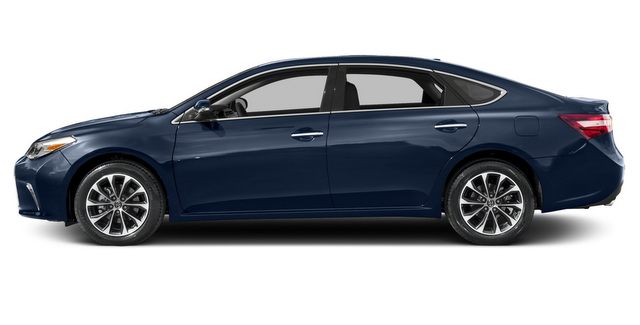
Avalon was introduced in 1994 for the 1995 model year, aimed at the six or so million owners of Toyota Camry and Honda Accords who might want to move up to a larger, more luxurious car. Through the years following it has grown in size with more power, improved handling and offered with most of the bells and whistles found in a luxury car (think Lexus).
The Avalon’s 2013 redesign completely changed the car’s exterior appearance, interior design, driving characteristics and, with a new hybrid model, the powertrain lineup. Prior to 2018, however, Toyota made a few significant improvements to the Avalon. The 2016 model saw a comprehensive styling refresh with a wider grille, the addition of a larger standard infotainment screen and the introduction of Toyota Safety Sense technologies as available equipment. For 2017, forward collision warning with automatic braking, lane departure warning with lane keep assist, high-beam assist and adaptive cruise control became standard
The starting retail price of the 2018 Toyota Avalon base model is $33,500. Four uplevel trims are also available: XLE Plus ($35,250), XLE Premium ($36,700), Touring ($37,900) and Limited ($41,300). Starting prices for the hybrid version range from $37,500 to $42,800.
With the Avalon, you can have your power and enjoy good fuel economy, too. Its EPA rating of 21 mpg in the city/30 highway/24 combined is among the thriftiest of the large car class. If you want most of the qualities of the Avalon with even better fuel economy, there’s the Avalon Hybrid. It achieves a class-leading 40 mpg city/39 mpg highway/40 combined.
Take A Second Look. Yes, It’s An Avalon
Stylists in California and Michigan drew the Avalon with the well-to-do tastes of older-middle-age empty-nester America in mind. The 2018 Avalon retains its big-car presence and remains a stretched take on the same structural underpinnings used by the Toyota Camry and the luxury Lexus ES sedan. The wheelbase is unchanged at 111-inches, but the car’s nose and tail have been nipped, shaving 2.3-inches of overall length that results in a wider, more masculine stance on the road.
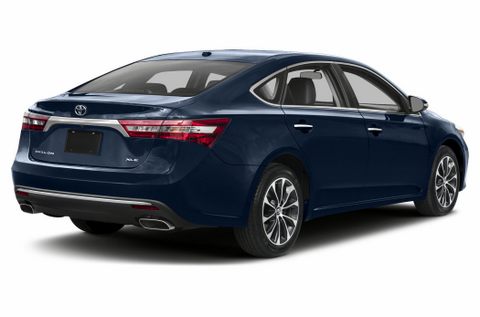
Sheetmetal is shaped to make shoppers forget the Avalon’s old-fogy image and reconsider it as a modern premium sedan. Toyota emphasizes that the car was designed by a “youthful design team”. Indeed, the 2018 Avalon looks nothing like the ultra-staid previous model. A bulging hood leads to swept-back headlamps and a can’t-miss gape-mouth grille.
Blistered fenders accent a sculpted side body, while the forward-raked C-pillar and sweeping roofline give the car a trendy coupe look. The backside is a crisp, design with taillamps that sweep around the rear and into the rear quarter panels.
Peek inside and you’ll know this isn’t your great uncle’s Avalon. The bench seat and column gearshift disappeared in 2005 and there hasn’t been a cassette player available for a decade.
The 2018 Toyota Avalon sedan offers perhaps the finest cabin in its class, with first-rate materials, user-friendly controls and impressive fit and finish. Design features are aesthetically pleasing and quality materials establish the Avalon as Toyota’s flagship car. Sitting behind the leather-wrapped three-spoke steering wheel, the impression is more Lexus-like than Toyota. The sweeping lines of the dash are modern, highlighted by a center-stack display screen that features smartphone-type “capacitive-touch” controls. Everything is at hand’s reach-plus; there are large, nicely damped conventional knobs for audio volume and tuning that augment the capacitive switchgear.
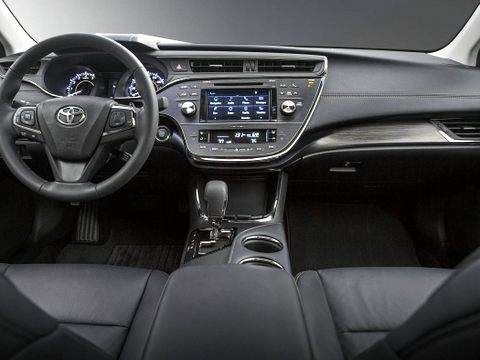
The touchscreen interface is well laid out and pretty intuitive to use. Have an insatiable appetite for electronic hand-held devices? The Avalon’s center console includes a tray designed to store your plug-ins and is equipped with a USB iPod interface, auxiliary ports, and three 12-volt power outlets.
Once you’re plugged in and ready to drive, you’ll find front seats that are highly adjustable, with ample side bolstering and lumbar support for both driver and passenger. There’s an abundance of room in the rear cabin for three passengers, and rear doors open to almost ninety degrees, allowing easy ingress and egress.
On the backside, the Avalon has a 16-cubic-foot trunk. A low liftover height makes for easy loading of heavy grocery bags or large items.
The 2018 Toyota Avalon upholds the car’s tradition of generous standard equipment, including dual-zone climate control, a proximity key and remote start. Standard infotainment features consist of Toyota’s Entune interface, a 7.0-inch touch screen, an eight-speaker audio system, navigation, satellite radio, a USB port, voice recognition, HD Radio, Bluetooth and Siri Eyes Free. Every model also comes with a rearview camera, forward collision warning with pedestrian detection and automatic braking, lane departure warning with lane keep assist, automatic high beams, and adaptive cruise control.
Optional features include tri-zone automatic climate control, the Entune App Suite (for advanced smartphone integration), a moonroof, a nine-speaker audio system, wireless charging for enabled phones, an 11-speaker JBL audio system, blind spot monitoring, rear cross traffic alert and rain-sensing windshield wipers.
How It Drives
Acceleration of the 2018 Toyota Avalon was smooth with a powerful feel that was reassuring when merging into fast moving freeway traffic. It comes standard with a 268-horsepower V6 engine paired with a six-speed automatic transmission, both of which feel polished and eager. It may not be blistering quick, but the time to reach 60 mph from a stop passes by in a very respectable 6.4 seconds.
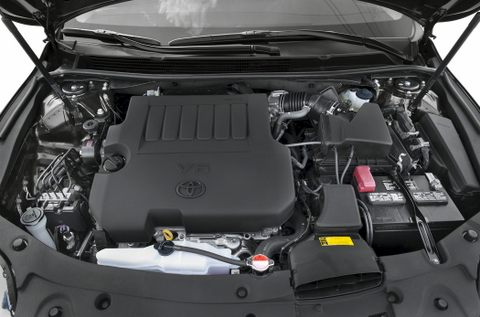
Quietness is a major Avalon asset. Wind rush and road noise are both quite low, a bonus for a car that excels in long-distance cruising.
The independent suspension—MacPherson struts up front, dual-link in the rear—soaks up most inconsistencies in the road while the body remains mostly unbothered. Curvy road excitement isn’t on the car’s agenda, but cornering at 85 percent is accomplished with confidence. Steering is nicely weighted, although somewhat slow; it’s light enough for parking maneuvers and provides decent feedback.
Miles driven during our week with the Avalon totaled 240 in a typical mix of in town, freeway and two-lane highways. The dashboard’s readout pegged our miles-per-gallon at 24.7 mpg, slightly better than the EPA’s combined rating.
Final Word
Larger than the Kia Optima, Ford Fusion and Honda Accord, the Avalon offers limousine-like rear-seat accommodations. While competitors like the Buick LaCrosse and Chrysler 300 offer the option of all-wheel drive, neither can match the Avalon’s impressive resale or customer loyalty, although Buick is getting close.
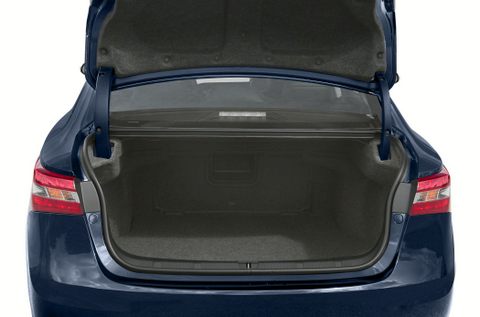
The 2018 Toyota Avalon sedan hasn’t strayed far from the formula that has worked so well for more than two decades: Provide driver and passengers a comfortable, quiet, plush experience. While most at home on the highway, the Avalon is easy to handle in the city and confined settings; it feels smaller than its size suggests.
Make sure to opt-in to the Clean Fleet Report newsletter (top right of page) to be notified of all new stories and vehicle reviews.
Related Stories You Might Enjoy—Other Sedan Options
Road Test: 2016 Kia Optima (we’ve also tested the 2017 Hybrid & 2018 PHEV)
Road Test: 2017 Ford Fusion (again, check out the 2017 Hybrid and 2019 Energi-PHEV)
Road Test: 2016 Honda Accord (and the 2017 Hybrid option)
Road Test: 2017 Chrysler 300
Road Test: 2018 Buick LaCrosse
Road Test: 2016 Chevrolet Impala (a bi-fuel version)
Road Test: 2016 Nissan Maxima
Disclosure:
Clean Fleet Report is loaned free test vehicles from automakers to evaluate, typically for a week at a time. Our road tests are based on this one-week drive of a new vehicle. Because of this we don’t address issues such as long-term reliability or total cost of ownership. In addition, we are often invited to manufacturer events highlighting new vehicles or technology. As part of these events we may be offered free transportation, lodging or meals. We do our best to present our unvarnished evaluations of vehicles and news irrespective of these inducements.
Our focus is on vehicles that offer the best fuel economy in their class, which leads us to emphasize electric cars, plug-in hybrids, hybrids and diesels. We also feature those efficient gas-powered vehicles that are among the top mpg vehicles in their class. In addition, we aim to offer reviews and news on advanced technology and the alternative fuel vehicle market. We welcome any feedback from vehicle owners and are dedicated to providing a forum for alternative viewpoints. Please let us know your views at publisher@cleanfleetreport.com.
